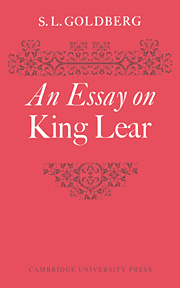4 - Lear and ‘true need’
Published online by Cambridge University Press: 22 August 2009
Summary
It is possible to realize what Cordelia is and what she represents only if one can bear to realize it in oneself, and for a large part of the action Lear himself cannot. The relevant quality is not Love, however, or an ideal goodness, much less sanctity; despite the way some critics talk, I doubt if we should really prefer it even if Lear did emerge from the reconciliation-scene with a wee halo of redemption over his head. What Cordelia represents is something necessary to love or goodness or sanctity no doubt, but certainly not identical with any of them, for it is no less necessary to any way of being fully alive. We might call it an open and vital ‘patience’ or an ‘integrity of being’, but such abstractions are hopelessly vague and ambiguous. Indeed, part of the greatness of the play lies in the sharp subtlety with which it distinguishes between the meanings that words like ‘patience’ or ‘integrity’ can have, and in the power with which it makes us acknowledge in Cordelia what either quality might mean at its best – even while making us also recognize, along with its necessity, its insufficiency in itself. Yet if we have to recognize that insufficiency even in her, who embodies it in its purest form, only in the other characters can its significance and limits be properly explored, and especially in the two who reach out furthest – Edgar and Lear.
- Type
- Chapter
- Information
- An Essay on King Lear , pp. 103 - 132Publisher: Cambridge University PressPrint publication year: 1974



